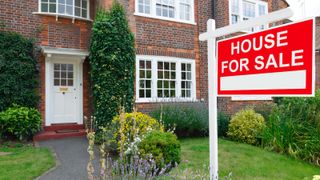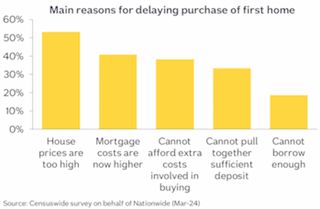House prices rise by 0.4% in May but what impact could the general election have on the market?
Here's what you need to know about house prices if you're thinking of buying or selling in 2024

House prices have experienced a modest rebound, rising by 0.4% month-on-month in May, according to Nationwide.
This increase follows a 0.4% decline in April, reflecting a market that appears to be stabilising despite ongoing affordability pressures and recent rises in longer-term interest rates.
However, with a general election looming experts have also predicted the impact this may have on house prices.
'How much is my house worth' may be crossing your mind at the moment – here's what you need to know about house prices in the UK.
House prices rise 1.3% annually in May
The latest figures from Nationwide reveal that the annual growth rate for house prices picked up to 1.3% annually in May, an improvement from the 0.6% recorded in April.
The average price of a UK home now stands at £264,249, up from £261,962 the previous month.
Robert Gardner, Nationwide's Chief Economist, commented on the data: "UK house prices increased by 0.4% in May, after taking account of seasonal effects. This resulted in a slight pickup in the annual rate of house price growth to 1.3% in May, from 0.6% the previous month.
Get the Homebuilding & Renovating Newsletter
Bring your dream home to life with expert advice, how to guides and design inspiration. Sign up for our newsletter and get two free tickets to a Homebuilding & Renovating Show near you.
“The market appears to be showing signs of resilience in the face of ongoing affordability pressures following the rise in longer-term interest rates in recent months. Consumer confidence has improved noticeably over the last few months, supported by solid wage gains and lower inflation."

Robert Gardner serves as the Chief Economist at Nationwide, where he heads a team dedicated to offering economic analysis and guidance, with a specific focus on the UK economy and a strong emphasis on monitoring the housing market and house prices.
General elections impact on house prices
As the UK approaches its general election on 4 July, questions have arisen regarding the potential impact on the housing market.
Robert Gardner addressed these concerns by examining historical data on house price movements around previous elections and the 2016 EU referendum. The analysis indicates that general elections have not historically caused significant volatility in house prices or disrupted prevailing trends.
Gardner explained: "On the whole, prevailing trends have been maintained just before, during, and after UK general elections. Broader economic trends appear to dominate any immediate election-related impacts.
"We also examined how activity, particularly house purchase mortgage approvals, responded to past UK elections. Here, the picture is less clear, but again there doesn’t seem to be any tangible impact in the three months either side of a general election."
Notably, the 2019 election was an exception due to the pandemic's impact, with the initial lockdown in 2020 suppressing housing market activity, which subsequently bounced back as restrictions were lifted.
Gardner concluded: "It appears that housing market trends have not traditionally been impacted around the time of general elections. Rightly or wrongly, for most homebuyers, elections are not foremost in their minds while buying or selling property."
House prices see record asking offers
The average asking price for properties on the market has reached a new record of £375,131, reflecting a 0.8% increase (+£2,807) this month, driven by the momentum of the Spring selling season.
Sales agreements in the first four months of the year are up by 17% compared to last year, surpassing the 12% rise in new listings.
Challenges still persist, such as the lengthy 154-day average between sale agreement and legal completion, with 62 days typically needed to find a buyer before the legal process begins. Sellers who price their properties correctly from the start sell much faster, as those requiring price reductions take over three times longer to find a buyer.
Tim Bannister Rightmove's, Director of Property Science, said: "Some predicted that property prices would suffer sharp falls and take a while to recover following the Bank of England increasing the Base Rate up to 5.25%, where it has remained since August 2023.
"However, the momentum of the Spring selling season has exerted enough upwards price pressure to reach a new record asking price. The top-of-the-ladder sector is still leading the way, while from a regional perspective the North East, with the cheapest average prices in Great Britain, has seen the strongest price growth.
"However, it’s important to remember that prices overall are still only 0.6% ahead of this time last year. The market remains price-sensitive, and with prices reaching new records in the majority of regions and mortgage rates remaining elevated, affordability for many home-buyers is still stretched.”

Tim Bannister joined Rightmove in 2010, initially working in our lettings division before transitioning his focus to insights. As the current Director of Property Science, Tim leverages data, technology, and analytics to create distinctive insights that inform and guide property-related decision-making processes.
Nearly half of first-time buyers have delayed plans due to high prices
Research by Nationwide found nearly half (49%) of prospective first-time buyers have delayed their plans with 53% saying high house prices are the reason.
However, 41% said higher mortgage costs were preventing them from buying and 84% said the cost of living crisis had affected their plans to buy.
Robert Gardner noted from the findings: “Interestingly, 55% of respondents said they would be willing to buy in another part of the country where house prices are cheaper, or where they could buy a bigger property. Inevitably, there is a lot of variation in how far people would be willing to move, but half said they would move more than 30 miles from their current location.
“Buying a property in a less expensive area appears to be the most common compromise that prospective buyers will make. Around a third (32%) said they would consider a smaller property than they wanted, while 28% would go for a property that needed work doing.

Affordability and base rate to determine future of the housing market
The future of house prices will be determined by affordability and future Bank of England base rate changes, according to industry experts.
The base rate was increased in 2023, and still stands at 5.25%, which has reduced affordability options for potential homebuyers as it has meant mortgage options were not only set at high levels but were reduced.
Amanda Bryden, Head of Mortgages at Halifax, said: "We can’t overlook the fact that affordability constraints are still a significant challenge, for both new buyers and those rolling off fixed-term deals. Mortgage rates have edged up again in recent weeks, primarily as a result of expectations around future Bank of England base rate changes, with markets now pricing in a slower pace of cuts.
“If, as is still expected, downward moves in Bank Rate come into play later this year, fixed mortgage rates should fall. Combined with the resilience displayed by the housing market over recent months, we now expect property prices to rise modestly over the course of 2024.”

Amanda has established herself as a notable advocate within the intermediary market, amassing over 26 years of experience in the mortgage industry. Her journey in the sector commenced as a mortgage broker, after which she assumed diverse senior positions within several prominent mortgage lenders nationwide.
Will house prices rise or fall in 2024?
For even more advice, information and inspiration delivered straight to your door, subscribe to Homebuilding & Renovating magazine.
While house prices show a consistent year-on-year increase the longer-term view reveals that house prices could be starting to stabilise.
Amanda Bryden stated that "buyers are adjusting their expectations" with first-time buyers in particular compensating for higher borrowing costs by targeting smaller homes.
"We see this reflected in property prices for the first few months of this year, with the value of flats rising most sharply, closing the ‘growth gap’ on bigger properties that’s existed for most of the last four years."

What does this mean for mortgages?
The current state of the mortgage market has created an atmosphere of uncertainty among potential homebuyers.
Mortgage rate rises have continued despite the Bank of England's (BoE) decision to keep the base rate at 5.25% in December. This meant the average five-year fixed mortgage rate is now 5.67%, down from its peak of 6.11% in July 2023.
Matt Smith, Rightmove’s mortgage expert said: "After a few weeks of mortgage rate increases, we've seen early signs that this current run of rate increases has peaked and we'd expect that average mortgage rates will begin to trickle down again soon.
"The market is still assuming that the first Base Rate cut will happen in the Summer, and today's decision is unlikely to change that view. All eyes now turn to the publication of April's inflation data, which is the next key milestone and is likely to determine the immediate direction of mortgage rates in the UK."
I’m buying/selling a house, what do I need to know?
The recent slowdown in consumer price inflation was not as significant as anticipated, leading to increased expectations for future Bank Rate decreases, according to Nationwide.
Robert Gardner advised: "Those looking to secure a new home for the new year should apply for a Mortgage in Principle to work out what they could afford, and listen to local estate agents about what's happening in their local housing market."
Despite recent fixed mortgage rate increases many potential buyers could find affordable housing options, especially with larger upfront deposits.
However, first-time buyers could find a welcome government announcement soon with the government proposing a 1% deposit limit for those buying their first house in an effort to get people onto the property ladder.
As well as this first-time buyers do not have to pay stamp duty for homes worth up to £425,000 whilst the stamp duty cut in September 2022 meant the threshold for stamp duty exemption in England and Northern Ireland was lifted for homes worth up to £250,000 for all other buyers.
Those planning on buying a house can take a look at our house viewing checklist as well as look at our guide on building surveys.

News Editor Joseph has previously written for Today’s Media and Chambers & Partners, focusing on news for conveyancers and industry professionals. Joseph has just started his own self build project, building his own home on his family’s farm with planning permission for a timber frame, three-bedroom house in a one-acre field. The foundation work has already begun and he hopes to have the home built in the next year. Prior to this he renovated his family's home as well as doing several DIY projects, including installing a shower, building sheds, and livestock fences and shelters for the farm’s animals. Outside of homebuilding, Joseph loves rugby and has written for Rugby World, the world’s largest rugby magazine.